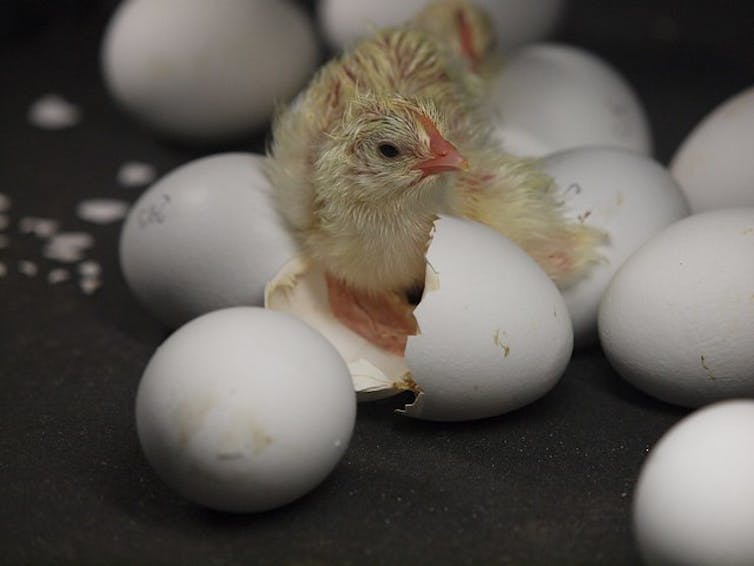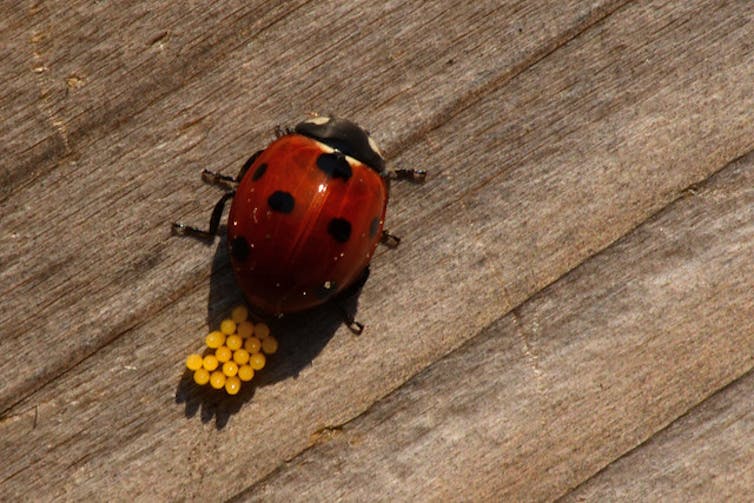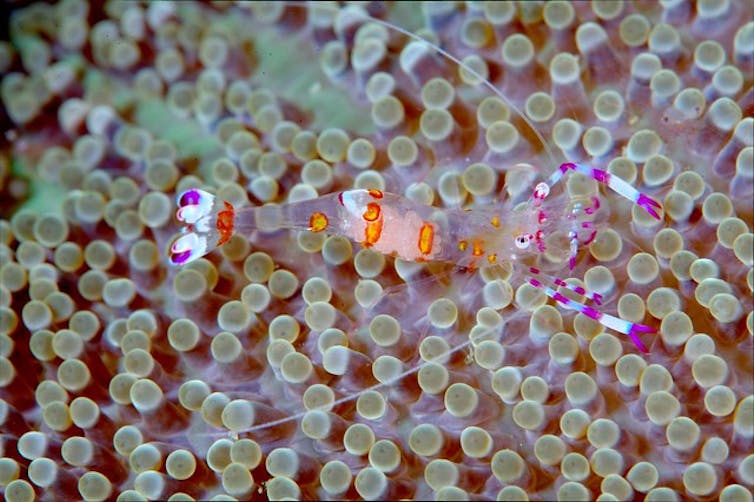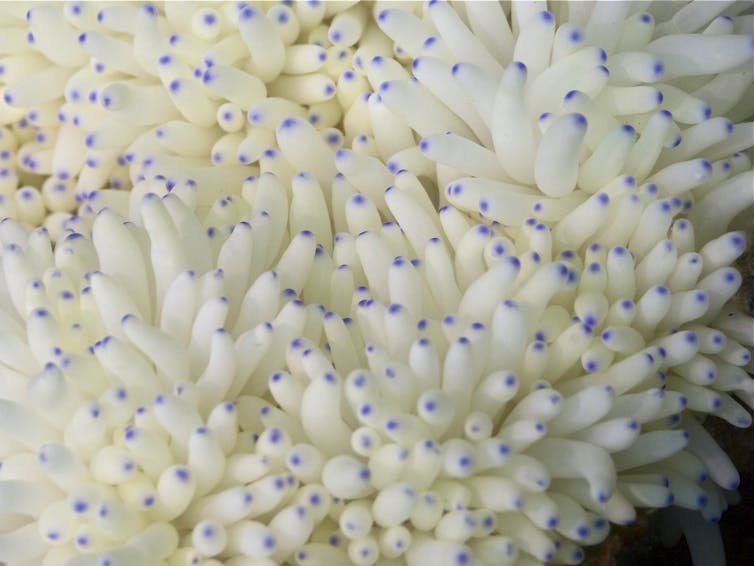why do eggs have a yolk?
- Written by Maggie J. Watson, Lecturer in Ornithology, Ecology, Conservation and Parasitology, Charles Sturt University
Curious Kids is a series for children. If you have a question you’d like an expert to answer, send it to curiouskids@theconversation.edu.au You might also like the podcast Imagine This, a co-production between ABC KIDS listen and The Conversation, based on Curious Kids.
Why do eggs have orange stuff inside? – Rafael, age 7.
This is a very interesting question. That orange stuff is called a yolk. It’s a great source of vitamins, minerals, fats and proteins packaged up by the female animal for an embryo (the developing cells that turn into a baby).
You probably know that the yellow bit inside a chicken’s egg is the yolk, but in fact a lot of animals lay eggs that have yolks in them. However, not all animal eggs have a yolk!
 Having a yolk in the egg allows the developing animal to stay inside the egg a bit longer, which may boost its chances of survival. The downside is the mother will need to work harder to find food to get the nutrients needed to create a nutritious, fatty yolk.
Flickr/Kai C. Schwarzer, CC BY
Having a yolk in the egg allows the developing animal to stay inside the egg a bit longer, which may boost its chances of survival. The downside is the mother will need to work harder to find food to get the nutrients needed to create a nutritious, fatty yolk.
Flickr/Kai C. Schwarzer, CC BY
Read more: Curious Kids: Is it true that male seahorses give birth?
A contest called evolution
To understand why different animal species have different types of eggs, you need to know that all living things change slowly over time, through a process called evolution.
When a living thing is born with a special difference – what we would call a “trait” – sometimes this trait helps them live and survive better than someone who doesn’t have that trait. This trait may help them live longer and have more babies.
Because of these differences in survival, eventually, the trait that lets one individual living thing live and prosper will become quite common and be found all throughout a species.
 Lots of animals lay eggs.
Flickr/Alias 0591, CC BY
Lots of animals lay eggs.
Flickr/Alias 0591, CC BY
Back to eggs
Imagine you are a worm living millions of years ago. You produce heaps and heaps of eggs that develop quickly into little worms. But most of the babies die because they are small and have to find food straight after hatching. They can’t go far because they are very little and so most starve to death (or are eaten by bigger creatures).
But what if some of those eggs happened to contain a little bit of fat from the mother? Compared to its brothers and sisters, the fat will allow the worm to spend just a little bit more time growing inside the egg and less time looking for food after hatching.
The worms that were lucky enough to have that fat inside the egg are more likely to survive long enough to have their own babies. And they pass on the fatty-egg trait to their own worm kids. Soon this fatty-egg trait becomes quite common.
So the worm who was able to feed its babies when they’re still inside the egg had more babies survive, and a yolk evolved.
Which eggs have a yolk and why?
Eggs with tiny bits of yolk are found in animals such as earthworms, leeches, clams, mussels, starfish, sea urchins, and marine arthropods (shrimp, lobsters, crabs) and some insects. These animals produce huge numbers of eggs.
 Shrimps/prawns lay a large number of eggs. if you look closely, you can see a lot of small, light pink eggs inside this prawn’s body.
Flickr/Klaus Stiefel, CC BY
Shrimps/prawns lay a large number of eggs. if you look closely, you can see a lot of small, light pink eggs inside this prawn’s body.
Flickr/Klaus Stiefel, CC BY
Most of the babies that grow in these sorts of eggs have to go through a lot of steps before they reach the adult stage. First they have to grow into a larvae (which is what we call a junior body, and often looks a bit like worm).
The babies have to change into a larvae so they can eat, and after having eaten a bit they develop into an adult (think of caterpillars that eventually turn into butterflies).
Animals that produce eggs with a bit more yolk have babies that can fully develop and skip the larvae step, such as in hagfish and snails.
Big yolks for big babies
Eggs with really large yolks are found in animals that produce very few eggs, and the offspring can use the yolk to develop completely. These sorts of eggs are found only in cephalopods (squid, octopus and nautilus) and some vertebrates (animals with backbones).
 Here are some squid eggs.
Flickr/Elias Levy, CC BY
Here are some squid eggs.
Flickr/Elias Levy, CC BY
Vertebrates that produce eggs with large yolks include bony fish, cartilaginous fish (sharks and rays), reptiles, birds and egg-laying mammals (platypus and echidnas).
The rest of the mammals (animals that don’t lay eggs) have found a different system. They have a placenta, which is a kind of a feeding sack linking mother to embryo inside the mother’s body. This system allows the developing embryo or fetus to get nutrients straight from the mother. That’s how you were grown!
Read more: Curious Kids: How does glow in the dark paint work?
Hello, curious kids! Have you got a question you’d like an expert to answer? Ask an adult to send your question to curiouskids@theconversation.edu.au
 CC BY-ND
Please tell us your name, age and which city you live in. We won’t be able to answer every question but we will do our best.
CC BY-ND
Please tell us your name, age and which city you live in. We won’t be able to answer every question but we will do our best.
Authors: Maggie J. Watson, Lecturer in Ornithology, Ecology, Conservation and Parasitology, Charles Sturt University
Read more http://theconversation.com/curious-kids-why-do-eggs-have-a-yolk-111605





